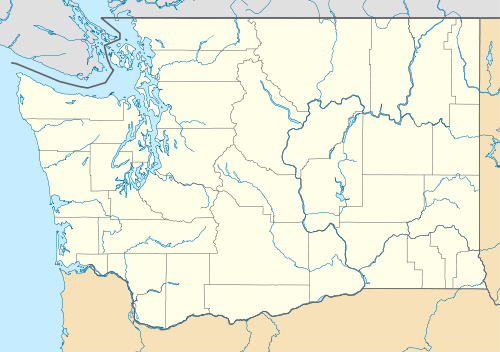Spokane Intermodal Center
Spokane Intermodal Center | ||||||||||||
|---|---|---|---|---|---|---|---|---|---|---|---|---|
| Amtrak inter-city rail station | ||||||||||||
 | ||||||||||||
| Location |
221 West 1st Avenue Spokane, Washington 99201[1] | |||||||||||
| Coordinates | 47°39′23″N 117°24′55″W / 47.6563°N 117.4153°WCoordinates: 47°39′23″N 117°24′55″W / 47.6563°N 117.4153°W | |||||||||||
| Owned by | City of Spokane | |||||||||||
| Line(s) | ||||||||||||
| Platforms | 1 island platform | |||||||||||
| Tracks | 5 | |||||||||||
| Connections |
Amtrak Thruway Motorcoach Greyhound Lines Northwestern Trailways Travel Washington Spokane Transit Authority | |||||||||||
| Construction | ||||||||||||
| Structure type | At-grade | |||||||||||
| Parking | Yes; paid | |||||||||||
| Disabled access | Yes | |||||||||||
| Other information | ||||||||||||
| Station code | SPK | |||||||||||
| History | ||||||||||||
| Opened | 1891 | |||||||||||
| Rebuilt | 1994 | |||||||||||
| Traffic | ||||||||||||
| Passengers (2015) |
50,365[2] | |||||||||||
| Services | ||||||||||||
| ||||||||||||
| Location | ||||||||||||
 Location of Spokane Intermodal Center within Washington | ||||||||||||
The Spokane Intermodal Center is an intermodal transport facility located in Spokane, Washington, United States. Built in 1891 for the Northern Pacific Railway, the historic facility now serves as a station, re-fueling, and service stop for the Amtrak Empire Builder, as well as the Greyhound and Trailways station for Spokane. The Empire Builder provides service daily between Chicago, Illinois and Spokane before continue on to both Seattle, Washington and Portland, Oregon.[Note 1]
The intermodal center is unique in the operation of the Empire Builder in that at Spokane, the westbound train is split into two sections; one heads to the King Street Station in Seattle and the other to the Union Station in Portland. Of the cars in the arriving westbound train, the last four Superliner cars (the Sightseer Lounge, two Coaches and a Sleeper car) go to Portland. The eastbound trains use the reverse operation, joining in Spokane before continuing on to east end of the line at the Chicago Union Station in Chicago. (The next eastbound stop is in Sandpoint, Idaho and the next westbound stops are in Ephrata and Pasco.)
The station located just north of Interstate 90 and is about 0.5 miles (0.80 km) southwest of the Spokane campus of the University of Washington and 1 mile (1.6 km) southwest of the campus of Gonzaga University.
The station, parking lot, and passenger platform are owned by the City of Spokane. The tracks are owned by BNSF Railway.[4]
Boardings and alightings
| Year | 2011[5] | 2012[6] | 2013[7] | 2014[8] | 2015[2] |
|---|---|---|---|---|---|
| Total | 46,798 | 62,773 | 63,975 | 53,500 | 50,365 |
| YOY Difference | - | 15,975 | 1,202 | -10,475 | -3,135 |
| YOY Difference % | - | 34.14% | 1.91% | -16.37% | -5.86% |
Notes
- ↑ As of 6 October 2013, the westbound trains (Routes 7 & 27) are scheduled to arrive together at 1:40 am and depart to Seattle (Route 7) at 2:15 am and to Portland (Route 27) at 2:45 am. The eastbound train from Portland (Route 27) is scheduled to arrive at 12:13 and the train from Seattle (Route 7) at 12:45 am. Both trains are scheduled to depart together at 1:30 am.[3]
References
- ↑ "Spokane, WA (SPK)". amtrak.com. Amtrak. Retrieved 3 Jan 2014.
- 1 2 "Amtrak Fact Sheet, Fiscal Year 2015, State of Washington" (PDF). amtrak.com. Amtrak. November 2015. Retrieved 12 Jan 2016.
- ↑ "Empire Builder" (PDF). amtrak.com. Amtrak. 6 Oct 2013. p. 2. Retrieved 3 Jan 2014.
- ↑ "Great American Stations: Spokane, WA (SPK)". greatamericanstations.com. Amtrak. Retrieved 3 Jan 2014.
- ↑ "Amtrak Fact Sheet, Fiscal Year 2011: State of Washington" (PDF). Amtrak. November 2011. p. 1. Retrieved 6 Jan 2015.
- ↑ "Amtrak Fact Sheet, Fiscal Year 2012: State of Washington" (PDF). Amtrak. November 2012. p. 1. Retrieved 6 Jan 2015.
- ↑ "Amtrak Fact Sheet, Fiscal Year 2013: State of Washington" (PDF). Amtrak. November 2013. p. 1. Retrieved 6 Jan 2015.
- ↑ "Amtrak Fact Sheet, Fiscal Year 2014: State of Washington" (PDF). Amtrak. November 2014. p. 1. Retrieved 12 Jan 2016.
External links
![]() Media related to Spokane Intermodal Center at Wikimedia Commons
Media related to Spokane Intermodal Center at Wikimedia Commons
- Amtrak – Stations – Spokane, WA
- Greyhound Lines website
- Northwestern Trailways website
- Trailways Transportation System website
- Spokane Transit website
- Spokane (SPK) Station, Great American Stations website
- Downtown Spokane Images
- Spokane Amtrak Station (USA RailGuide -- TrainWeb)